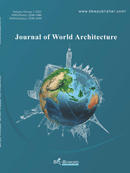Abstract
This article will use Foucault’s theory to critically consider the relationship between power, people, space and society at the boundary where different powers conflict with each other. Through the analysis of the project “Decolonizing Al Nada,” this article will discuss how relations with those with power and social mentality are reframed at the border through the reconstruction of architecture and space.
References
Alessandro P, Beit S, 2016, Israel Al Nada: Destruction and Reconstruction. Available at: http://www.decolonizing.ps/site/cycles-of-destruction-and-reconstruction/
Biemann U, 2002, Performing the Border: On Gender, Transnational Bodies, and Technology. Globalization on the Line: Culture, Capital, and Citizenship at us Borders, 99-118.
Borden I, Penner B, Rendell J, 2002, Bell Hooks: “Choosing the Margin as a Space of Radical Openness.” In Gender Space Architecture, Routledge, 219-225.
Foucoult M, 1975, Discipline and Punish. A. Sheridan Tr, Paris FR, et al., 1982, The subject and power. Critical Inquiry, 8(4): 777-795.
Foucault M, 1980, Power/Knowledge: Selected Interviews and Other Writings 1972–1977, New York, Pantheon.
